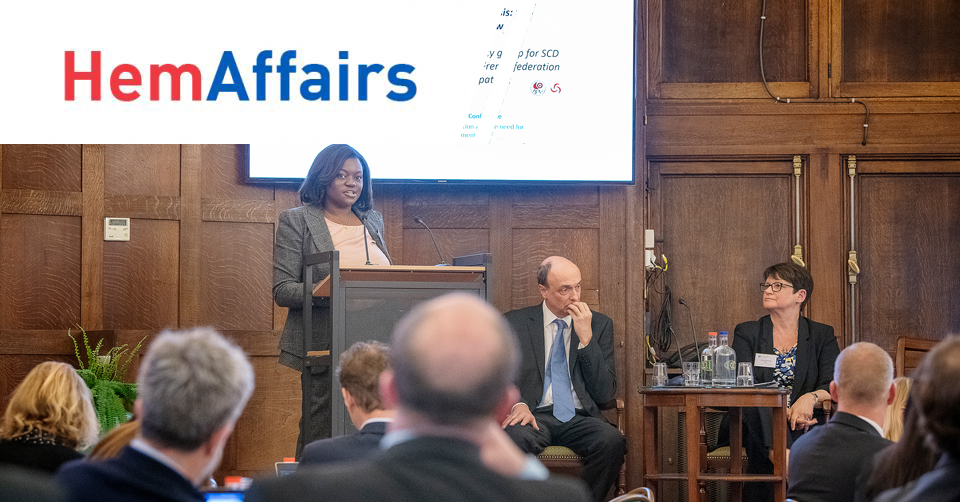This information originally appeared on the previous EHA website. Links to other pages may be inactive.

Elvie Ingoli, president of the German association of SCD and thalassemia patients, at the 7th EAPM Presidency Conference in Brussels.
Sickle Cell Disease (SCD) is relatively new to many parts of Europe. To prevent it form spreading, the recognition and treatment of the disease is crucial to avoid irreversible impact and provide proper patient care. Dr David Rees, pediatric hematologist from King’s College London, and Elvie Ingoli, president of the German Sickle Cell Disease and Thalassaemia Association, highlighted the importance of education during the second EHA panel discussion at the 7th EAPM Presidency Conference. They also emphasized the need for EU-level support and guidance to enable the early screening, identification and cross-border follow-up of patients with SCD across Europe.
The issue
Due to increased global and intra-EU mobility and migration, the number of patients with SCD in Europe has increased. According to the European Medicines Agency, SCD affected 2.6 in 10,000 people in the European Union in 2017.
SCD is a highly prevalent disease worldwide, particularly among populations in African countries, parts of the Middle East and other countries around the equator. The disease often has a highly negative impact on the quality of life of patients and medical costs can be excessive. European coordination, collaboration and funding are necessary to foster education on SCD and guide healthcare systems towards early diagnoses and optimizing treatments.
Policy opportunities
Understanding the severity of SCD is important for healthcare professionals, policymakers, patients and the public-at-large. European-wide collaborative action on three related challenges could make a difference in supporting those communities:
- Support through education: It is one of EHA’s top priorities to educate healthcare professionals, policymakers, patients and the public about SCD. Countries which previously had low numbers of patients lack the facilities and expertise in SCD. Moreover, patient numbers are not known in most European countries. EHA therefore supports EuroBloodNet (the European Reference Network in Rare Hematological Diseases) in its current effort to develop a European registry for SCD. EHA takes on an active role in educating healthcare professionals and patients, and welcomes efforts by the European Commission and Member States to contribute to raising awareness about SCD and the registry. In this context it further calls for increased and sustained EU support for EuroBloodNet.
- Need for funding: Increased awareness and research funding from the EU is necessary to optimize diagnosis and treatment as well as prevention of SCD. Even small amounts of funding can already have a noticeable impact on European health systems’ ability to deal with the growing threat to public health posed by this disease. Under Horizon Europe the EC identified ‘non-communicable and rare diseases’ as part of the six priorities for health research and innovation. EHA will be actively advocating for EU funding to further support SCD research and education.
- Guidance and tools for screening and follow-up: EHA signals a strong need for EU-wide screening and tracking of SCD patients. The early detection of the disease through (neonatal) screening is key to early diagnosis and effective treatment, especially in children. Thus, EHA calls for common guidance and tools for screening and to ensure data comparability across Member States. Development of tools for tracking and following-up with patients will also help to enhance patient care. Contributing to those objectives, EHA is developing a so-called SCD curriculum, which will outline minimum requirements for screening and tracking SCD patients and support healthcare professionals in diagnosing and treating the disease.
The future
With the EU elections just around the corner, no regulatory actions will be undertaken until the new Commission takes office. Meanwhile, affected babies continue to be born and too many patients are not getting timely diagnosis and adequate treatment. Hopefully, the new Commission will feel the sense of urgency and will put EU-wide efforts to put SCD high on the agenda. EHA remains fully committed to support and lead such efforts and will continue to educate healthcare professionals, raise awareness among EU policymakers and push for collaborative action to improve the lives of patients with SCD.